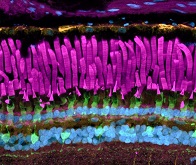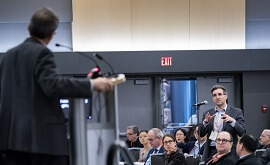Call for Biomarkers session proposals
Key Dates
- Deadline to submit proposal closed June 26
- Proposal selection notification: July 26
- Conference dates: Nov. 8 -9
ARVO’s virtual Biomarkers in Ophthalmology Conference will inform and expand basic and clinician-scientists' understanding of biomarkers and their current and future role in diagnosing, treating and curing ocular disorders.
By submitting a session proposal, you are contributing to the growth of biomarker research in ophthalmology and enhancing its potential impact on diagnostic systems and therapies. See below for additional details on questions for you to consider as you develop your sessions.
Conference goals
The Biomarkers in Ophthalmology Conference will advance our understanding of biomarkers for use in ophthalmology by:
- Exploring how biomarkers are and may be used in ophthalmic research and the development of diagnostic tools such as OCT, imaging and artificial intelligence.
- Uncovering unmet needs for novel biomarkers
- Fostering connections and collaborations
Proposal submission requirements
ARVO welcomes proposals from (members/nonmembers) that have relevance to members of our community, align with the conference goals, and move us forward in our shared mission to enhance our understanding of the visual system and preventing, treating and curing its disorders.
Meeting registration is required for all session organizers, moderators, presenters and panelists.
Guide to submission
The information that you include in your submission will be used by the reviewers to understand your proposal and what the proposed session will offer attendees, help ARVO market your session, and help attendees find the sessions most relevant to them.
Proposal outline
Your proposal should include the following components:
Session title — something succinct and descriptive that quickly conveys to both reviewers and conference participants what the session is about.
Description — a short description (250 words or less) of the purpose of the session and content to be covered (ARVO reserves the right to edit descriptions). The most important information to convey in the description is the knowledge that will be shared and the takeaways participants will gain from your session. The session description should also be used to describe how you plan to run the session, giving the reviewer a chance to understand how the session will be organized and what participants can expect. If your session is accepted, you will be asked to provide a brief, 50-word description for the conference program that can be further refined to focus on the core elements of your session.
Organizers — provide full names, affiliations, email addresses and CV’s for all organizers (maximum of 3 per session)
Faculty — provide full names, affiliations, email addresses, and links to faculty webpages and/or publication records for all moderators, panelists and speakers.
Diverse perspectives — A short statement on the diverse range of perspectives represented in your session, which will help reviewers understand the session makeup and help ARVO promote the full range of viewpoints being shared.
Target Audience — Select one of four audience “levels” that describes the target audience for your session. This will help attendees know what sessions are most relevant for them, based on their role in their organization, and their experience in the field.
- Foundational (new biomarker researchers) — Sessions for this audience focus on introducing the concepts, themes and issues involved in biomarker research. They provide introductions to a new area of research that may be unfamiliar to attendees, regardless of their career stage.
- Applied (experienced researchers) — Audiences for these sessions include professionals with experienced practice in their areas of interest or those looking to build on existing research. These sessions focus on deepening understanding and engagement, building the capacity of individuals and organizations to improve their practices, operations, and areas of expertise. These sessions may also be a deeper dive into a topic for researchers who are experienced with a given approach and want to dig into the lessons learned and new techniques to apply in their own work.
- Strategic (advanced-career professionals) — This audience includes researchers, professionals and individuals who are in positions responsible for setting directions for their organizations or are influencers in the field. Sessions for this audience address topics relevant to high-level strategic work that is establishing guidelines and advancing the field.
- Universal (all audiences) — Suitable for all attendees, at all levels of familiarity, experience, and expertise with the topic.
Session Format — Select the format best suited to meet the goals outlined for your session. The format will help set expectations for what attendees will experience.Consider the various options for content presentation, audience interaction and discussion.
- Panel — Choose this format to lead a conversation with recognized experts in the field.These sessions offer a moderated discussion between three to four panelists, typically followed by 15–20 minutes of questions and answers with the audience. Panels are opportunities for thought-provoking discussions among experts with different perspectives on the session theme or topic. Session hosts pre-plan the discussion themes and questions. Panelists should represent multiple institutions and research settings. (Total duration: 60 minutes)
- Symposium — Choose this format to share content in a structured format.These sessions open with presentations of approximately 10 minutes per presenter (maximum five presenters), followed by open discussions that allow the audience and presenters to interact. Session moderators introduce the presenters and facilitate both the discussion and wrap-up. (Total duration: 75 minutes)
- Debate — Choose this format to examine a topic, issue or theme where there are competing ideas, each with its own merits and shortcomings. This format takes a central theme or question and has two speakers debate for and against it. At the start, participants are polled to measure their opinion on the topic. Following the debate, they are polled again to see if there are any changes in opinion. The “winner” of the debate is the speaker who convinced the most audience members to change their votes. A maximum of three themes or questions can be debated in each session. Session moderators manage the debate and audience polling. (Total duration: 75 minutes)
- Breakout — Choose this format if you want to lead an open discussion with the audience, create an opportunity to network with your colleague, share ideas for applying the content to individual research projects or other similar informal conversations. These sessions involve active participation from the audience in an unstructured manner. Topics and themes can be as diverse as brainstorming about a specific challenge in the field, setting personal goals, and speed networking. Session facilitator(s) describe the session goals, encourage participation and summarize the discussion. (Total duration: 60 minutes)
- Workshop —Choose this format if you want to teach a skill or facilitate the application of complex ideas and concepts.The workshop format has participants working together in an interactive session designed to be hands-on and collaborative. While there may be lessons conveyed by the session leader(s), the emphasis is on facilitated peer-discussion, hands-on activities, and real-world problem solving. (Total duration: 75 minutes)
- Other (new format) — Be creative and propose a new or different approach. Include specific details for how the session will be designed, set-up, and facilitated/moderated. (Total duration: 60 minutes) – Contact education@arvo.org for guidance regarding the proposal form.
Category — describes the major content focus of your session (e.g. anterior or posterior, biofluids, microscopy, AI), it will be used to help conference participants find the content most relevant for them. Select the one category that best fits your session. Categories will be used to group sessions and for the session review process.
- Current landscape
- Aqueous humor
- Vitreous
- Tears
- Bio-fluids (e.g. blood, urine)
- Conjunctiva
- Artificial intelligence
- OCT and Imaging
- Omics
- Other
Tag — Indicate the tag(s) that match the specific eye diseases to be addressed during the session. Select “Not applicable” if the session is not disease specific.
- Age-related macular degeneration
- Cataract
- Corneal dystrophies
- Diabetic retinopathy
- Dry eye diseases
- Glaucoma
- Immunologic disorders
- Inherited retinal diseases
- Inflammation
- Neoplastic disease
- Neuro-ophthalmology
- Not applicable
- Other
Educational needs
The following questions are intended to spark your thinking and help you develop a session proposal that aligns with the conference goals. You are encouraged to consider multiple questions.
● What is the current state of biomarker research in ophthalmology?
● What has been inherent in past efforts? Have these qualities led to successes or failures?
● What controversies and challenges have stalled progress?
● What will be most important to our future efforts?
● How will we test new ideas, and measure our impact along the way?
● What are the unmet needs and how can we start to meet them?
● What collaborations do we need to foster within our field to ensure we have the creativity, strength, and resilience, to pursue our future plans?
● What partnerships will we need to create with those outside our field to ensure we have the right expertise, networks, and resources to realize our vision?
Integrity and independence
The content of each session must be independent, objective, scientifically rigorous, balanced, and free of bias. Promotion of any kind is strictly prohibited.
The Association for Research in Vision and Ophthalmology (ARVO) is accredited by the Accreditation Council for Continuing Medical Education (ACCME) to provide continuing medical education for physicians.
ARVO follows all accreditation rules when planning and delivering our educational programs: www.accme.org/accreditation-rules
Participation of owners and employees of ineligible companies is permitted within nonaccredited sessions. The accreditation status of each session will be determined during the proposal review process.
Selection process
The Conference Planning Committee will review all proposals submitted. Before and after making final selections, staff may contact submitters to ask for clarification and/or offer feedback to session organizers.
Contact us
For assistance in refining topics or identifying other speakers to add to your session proposal, please contact ARVO at education@arvo.org




